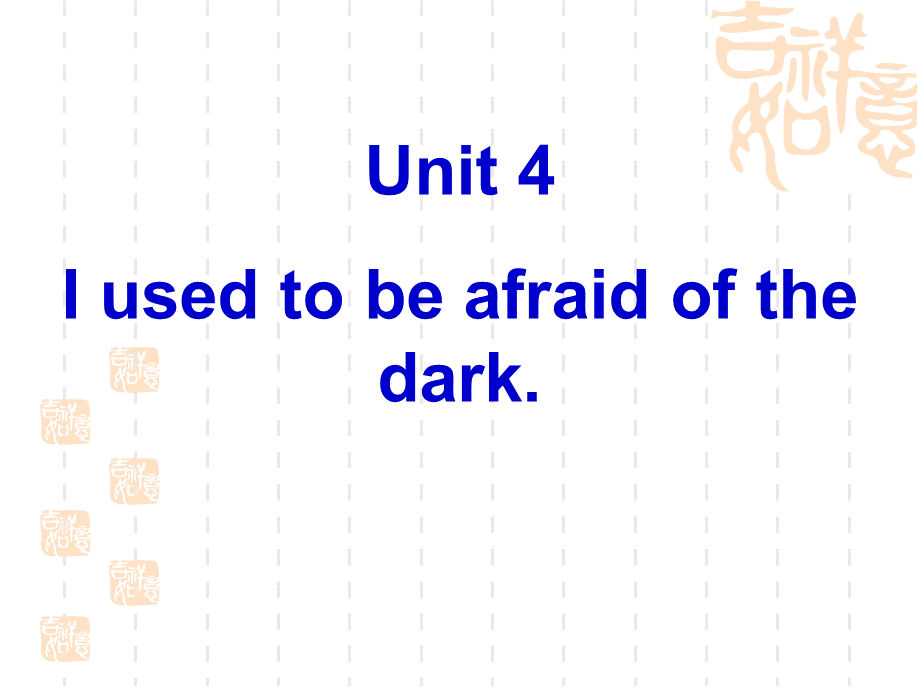人教新目标九年级UnitIusedtobeafraidofthedark全单元课件.ppt
《人教新目标九年级UnitIusedtobeafraidofthedark全单元课件.ppt》由会员分享,可在线阅读,更多相关《人教新目标九年级UnitIusedtobeafraidofthedark全单元课件.ppt(97页珍藏版)》请在冰点文库上搜索。

Unit4Iusedtobeafraidofthedark.,SectionA1a-2c,LanguageGoal,Talkaboutwhatyouusedtobelike,Objectives,Tolearntounderstandanduseusedto+verbTolistenandspeakaboutwhatoneusedtobelikeandwhatoneusedtodo,Lookatthepicturesanddescribethepeople.,Whatdoeshe/shelooklike?
short/brownhair短/黄头发,long/blackhair长/黑头发,curlyhair卷发,tall/goodlooking高/相貌好看的,short/handsome矮/英俊的,strong/heavy强壮的/重的,thin瘦的,Whatdoeshe/shelooklike?
Howcanwedescribethepersonality?
funny,quiet,outgoing,GuessingGame,inthepast,now,KateGreen,Kateistallnow.Butshewasveryshortinthepast.,Kateusedtobeshort.,VS,Heusedtobeugly,butnowheisreallyhandsome.,Hewasuglywhenhewasastudent,butheisreallyhandsomenow.,VS,Heusedtobeshybutnowheisreallysmart.,Hewasshywhenhewasachild,butheisreallysmartnow.,Changeinpersonality,WhenIwasyoung,now,shyshortfunnybeinterestedindrawinglikecartoonscurlyhair,outgoingtallseriousbeinterestedinthinkinglikemoviesstraighthair,1aFillinthechartwithwordstodescribepeople.,heavy,smart,young,unfriendly,1bListen.Bobisseeingsomefriendsforthefirsttimeinfouryears.Whatdidhisfriendsusetolooklike?
Mariousedtobe_.Heusedtowear_.2.Amyusedtobe_.Sheusedtohave_hair.3.Tinausedtohave_and_hair.,short,glasses,tall,short,red,curly,1cLookatthepicturein1aandmakeconversations.,A:
DidMariousetobeshort?
B:
Yes,hedid.Heusedtobereallyshort.A:
Whatshelikenow?
B:
Hestallnow.,1.Mario,youusedtobeshort,didntyou?
马里奥,你过去很矮,对吗?
本句是一个反义疑问句,反义疑问句的特点是“前否后肯”或“前肯后否”,而且后半句在时态、人称和数等方面必须与前半句保持一致。
Youareadoctor,arentyou?
你是个医生,是吗?
wecanttakebooksout,arewe?
我们不能把书带出去,对吗?
Explanations,_friendly_outgoing_serious_humorous_silent_active_brave_quiet_helpful,2aListenandcheck()thewordsyouhear.,2bListenagainandcompletethechartabouthowPaulahaschanged.,quiet,outgoing,sports,soccer,swim,science,musicclass,piano,piano,2cMakeconversationsaboutPaulausingtheinformationin2b.,A:
Paulausedtobereallyquiet.B:
Iknow.Shewasalwayssilentinclass.,Whohaschangedmost?
Survey,Alfred:
Thispartyissuchagreatidea!
Gina:
Iagree.Itsbeenthreeyearssincewelastsawourprimaryschoolclassmates.Alfred:
Itsinterestingtoseehowpeoplehavechanged.Gina:
Billyhaschangedsomuch!
Heusedtobesoshyandquiet.Alfred:
Yeah,hisfacealwaysturnedredwhenhetalkedtogirls!
2dRole-playtheconversation.,Gina:
Iusedtoseehimreadinginthelibraryeveryday.Alfred:
Thatsbecausehewasareallygoodstudent.Hestudiedhardandgotgoodscoresonhisexams.Gina:
Didheusetowearglasses?
Alfred:
Yes,andheusedtobethin,too.Butlookhowbigandstrongheisnow!
Gina:
Hessopopularnow.Lookatallthegirlsaroundhim!
3.Shewasalwayssilentinclass.在课堂上她总是很沉默。
silent作形容词,意为“不说话的;沉默的”,其名词形式为silence(沉默;寂静)Shewassilentwhenhermotheraskedherquestions.她妈妈问她问题时她沉默不语。
Silent的副词形式是silently(默默的;静静的)Hewentintotheclassroomandsatdownsilently.他走进教室静静地坐下来。
2)keepsilent意为“保持安静”Pleasekeepsilentinpublicplaces.在公共场合下请保持安静。
quiet,calm,silent,still,peaceful这些形容词均含“平静的,无声无息”之意。
quiet普通用词,指没有喧闹、活动或骚乱的寂静状态。
calm普通用词,既可指天气、海洋等的平静状态,又可指人的镇定沉着、不慌乱,不受外界影响和情绪支配。
silent普通用词,指缄默不语或无声无息。
still指平静而又安定的状态。
peaceful普通用词,指一种不受外物扰乱和刺激的内在宁静或和平状态。
4.Shestillplaythepianofromtimetotime.她仍然时常弹钢琴。
(1)still副词,意为“仍然”,用来说明某人或某物没有变化。
still在句中通常放在实义动词前,助动词、情态动词、连系动词后面。
Thewomanstilllivesinshanghai.Heisstillintheclassroom.
(2)Fromtimetotime意为“时常;有时”相当于sometimes/attimes.Shegoestothemoviesfromtimetotime.,与时间有关的短语:
ontime准时intime及时allthetime总是aheadoftime提前atonetime曾经,一度atanytime随时atnotime绝不innotime立刻,马上,Hisfacealwaysturnedredwhenhetalkedtogirls.,Turn连系动词,变成,接形容词作表语。
Turn,become,getTurn变成,用于颜色或性质方面的变化,强调变化的结果。
Themanturnedbluewithfear.Become变得,成为指身份职位的变化,强调变化的过程已经完成。
ShebecomeanEnglishteacher.Get变得,用于口语,表示变化过程。
Inwinter,thedaysgetshorter.,Use“usedto”and“butnow”todescribethefollowingpicture.,Review,Sheusedtoplaysoccer,butnowsheplaystennis.,Sheusedtobeshort,butnowsheistall.,Sheusedtohavelonghair,butnowshehasshorthair.,Imafraidof.,Iusedtobeafraidofsnakes.ButnowImnotafraidofthem.Howaboutyou?
_howCandyslifehaschanged_Candysadvicetoyoungpeople_Candysbackground,3aSkimthearticleandidentifytheparagraphsinwhichthefollowinginformationappears.Numbertheinformation13.,3,2,1,ForthismonthsYoungWorldmagazine,Iinterviewed19-year-oldAsianpopstarCandyWang.Candytoldmethatsheusedtobereallyshyandtookupsingingtodealwithhershyness.Asshegotbetter,shedaredtosinginfrontofherclass,andthenforthewholeschool.Nowshesnotshyanymoreandlovessinginginfrontofcrowds.,FromShyGirltoPopStar,IaskedCandyhowlifewasdifferentaftershebecamefamous.Sheexplainedthattherearemanygoodthings,likebeingabletotravelandmeetnewpeopleallthetime.“Ididntusetobepopularinschool,butnowIgettonsofattentioneverywhereIgo.”However,toomuchattentioncanalsobeabadthing.“IalwayshavetoworryabouthowIappeartoothersandIhavetobeverycarefulaboutwhatIsayordo.AndIdonthavemuchprivatetimeanymore.Hangingoutwithfriendsisalmostimpossibleformenowbecausetherearealwaysguardsaroundme.”,WhatdoesCandyhavetosaytoallthoseyoungpeoplewhowanttobecomefamous?
“Well,”shebeginsslowly,“youhavetobepreparedtogiveupyournormallife.Youcanneverimaginehowdifficulttheroadtosuccessis.ManytimesIthoughtaboutgivingup,butIfoughton.Youreallyrequirealotoftalentandhardworktosucceed.Onlyaverysmallnumberofpeoplemakeittothetop.”,1.Candytoldmethatsheusedtobereallyshyandtookupsingingtodealwithhershyness.坎迪告诉她过去真的很羞涩,开始唱歌是为了克服自己的羞涩。
(1)takeup此处意为“开始从事”Hedroppedmedicineandtookupphysics.他放弃医学,开始学物理。
takeup的其他用法:
1)“占用”Thetabletakesuptoomuchroom.2)“继续”Wetookupourjourneythenextday.,Languagepoints,
(2)dealwith相当于dowith,意为“对付;处理Howdidyoudealwiththemilk?
你是怎么处理那些牛奶的?
Hehaslearnttodealwithallkindsofdifficulties.,dowith与dealwith两者都可以用来表示“处理”do侧重于对象,deal侧重于方式方法。
在特殊问句中,dowith与what连用,dealwith则与How连用。
Idontknowhowtheydealwiththeproblem.=Idontknowwhattheydowiththeproblem.,
(2)infrontof意为“在.的前面”。
Thereisalittlechildinfrontofthehouse.房前有一个小孩。
辨析infrontof与inthefrontofinfrontof:
在前面,强调在某一物体外部的前面。
inthefrontof:
“在的前部”,强调在某一物体内部的前面(3)whole形容词,意为“整个的;全部的”,常用结构为“the+whole+单数名词”。
all也有此意,但语序不同:
all用于冠词、所有格或其他限定词之前;whole用于冠词、所有格及其他限定词之后。
allthetime总是;一直thewholetime全部的时间allmylife我的一生mywholelife我的一生注意1)如果没有冠词或其他限定词,whole不能与单数名词连用Thewholecitywasburning.整个城市都在燃烧。
2)whole一般不与不可数名词及物质名词连用。
(误)thewholemoney/bread(正)allthemoney/bread,4.likebeingabletotravelandmeetnewpeopleallthetime.像总是能旅行和结识新朋友。
beableto与can都可以表示能力,意为“会;能(够)”。
beableto:
表示经过努力达到目的,可用于各种时态can:
表示有能力做某事,仅用于一般现在时和一般过去时,5.Ididntusetobepopularinschool,butnowIgettonsofattentioneverywhereIgo.”过去我在学校里默默无闻,但是现在无论我走到哪里,都得到太多的关注。
(1)tonsof意为“很多的;大量的”,是英语中一种夸张的表达方式。
ton的本义为“吨”。
Hehasbeenlateforschooltonsoftimes.他上学屡次迟到。
(2)getattention意为“得到/引起.注意”Hetriedtogettheattentionofapassingpoliceman.他试图引起一位路过的警察的注意。
Sheusedtobeshy,butnowshesnotshy_.2.Shedidntusetobe_inschool,butnowshegetslotsofattention.Sheusedto_withfriends,butitisalmostimpossiblenow.4.Shedidntuseto_howsheappearstoothers,butnowshedoes.,3bReadthearticleagainandcompletethesentencesaboutCandy.,anymore,popular,hangout,worryabout,3cSupposeyouaretheinterviewerandyourpartnerisCandy.Askandanswerquestions.,Pairwork,SectionAGrammarFocus,Unit4Iusedtobeafraidofthedark.,GrammarFocus,usedto是一个固定结构,它的意思是“过去经常、以前常常”,它的后面用动词原形,它表示过去存在某种状态或者过去的某种经常性、习惯性的行为或者动作,并意味着这种动作目前已经不存在,所以它只能用一般过去时,不能用现在时态。
B)主语usednotto动词原形.第一种否定句型,did构成;第二种变否定句直接在used后面加not即可,usednot可以缩写成usednt或usent。
例如:
Youdidntusetodrink.Youusednttodrink.,Sheusedtosmokealot.Didsheusetosmokealot?
Usedshetosmokealot?
Didyoursisterusetobequiet?
Usedto的一般疑问句形式,(四)usedto的状语可以用副词always,often,sometimes等,但是仍然是过去的习惯,不是指现在的习惯,所以不能用一般现在时。
例如:
Healwaysusedtobelateforclass.他过去常常上课迟到。
(五)usedto可以用在therebe结构中表示“过去经常有”的意思。
Thereusedtobe,Thereusedtobealotofteachersintheschool.100yearsago,thereusedtobeabeautifulvillageinthecountryThereusedtobeacleveroldmaninthevillage.,4aWritesentencesaboutthepastusingusedto.,Grace/watchalotofTV/watchalotofmoviesGraceusedtowatchalotofTV.Shedidntusetowatchalotofmovies.2.mymom/havecurlyhair/havestraighthair__,Mymomusedtohavecurlyhair.Shedidntusetohavestraighthair.,3.Jerry/readbooksonEuropeanhistory/readbooksonAfricanculture__4.Sandy/teachBritishEnglish/teachAmericanEnglish__,JerryusedtoreadbooksonEuropeanhistory.HedidntusetoreadbooksonAfricanculture.,SandyusedtoteachBritishEnglish.ShedidntusetoteachAmericanEnglish.,4blookattheinformationandwritesentencesaboutEmily.,4cWhichofthesethingsdidyouusetobeafraidof?
Whichonesareyoustillafraidof?
Checktheboxesandthenaskyourpartner.,SectionB,Unit4Iusedtobeafraidofthedark.,Jennyusedtoplaythepiano.,用usedto句型说出与图片情景相符的句子。
Jenny,Mikeusedtowearglasses.,Mike,glasses,Peterusedtoplaysoccer.,Peter,soccer,Amy,longhair,Amyusedtohavelonghair.,Markusedtobeontheswimteam.,Mark,swimteam,1aCheck()thethingsyouusedtolikewhenyouwereachild.,_musicclass,_P.E.class,_paintingpictures,_antsandotherinsects,Whatotherthingsdidyouusetoliketodowhenyouwereachild?
Groupwork,A:
Whatdidyouusetoliketodo?
B:
Iusedtolike,A:
Doyouhavecolorfulchildhood?
B:
Yes/No,readcomics,playwithdoll